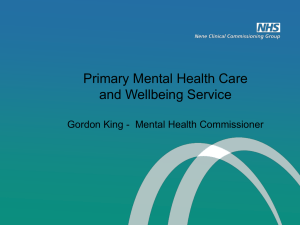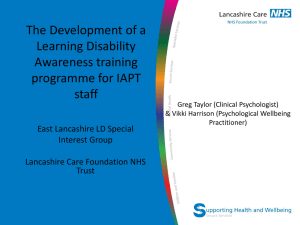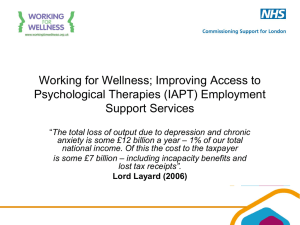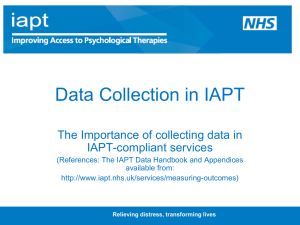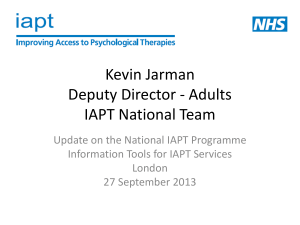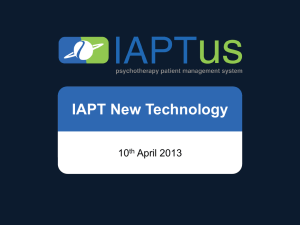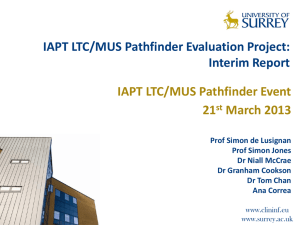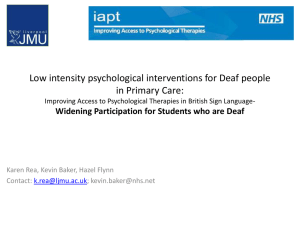IAPT
advertisement
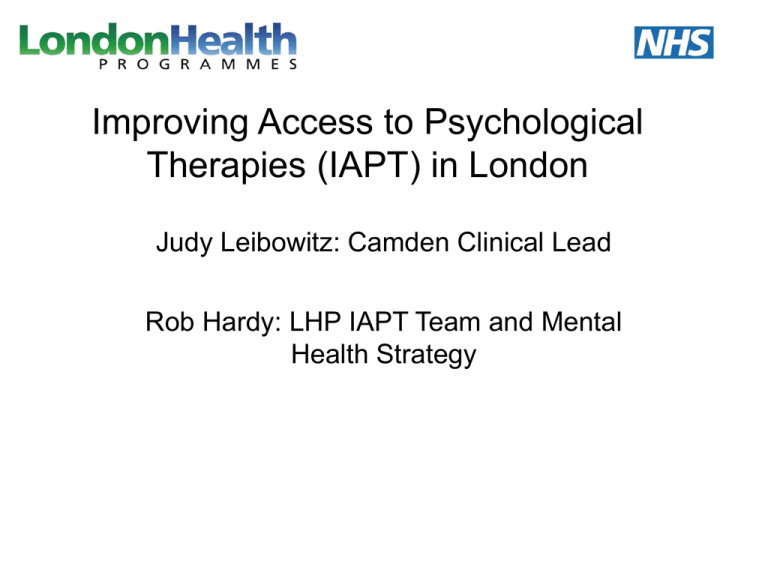
Improving Access to Psychological Therapies (IAPT) in London Judy Leibowitz: Camden Clinical Lead Rob Hardy: LHP IAPT Team and Mental Health Strategy Agenda •Welcome and Introductions •Aims •What is IAPT? •The Programme in London •Challenges, Opportunities and Discussion Aims •Greater understanding of the IAPT programme and what it is trying to achieve •How the programme has been rolled out, specific challenges for London and further work to be done by 2014 •Where IAPT might sit in the new commissioning landscape •How IAPT can fit in to wider primary care strategies including further engagement with primary care •What IAPT can offer local authorities and Health and Wellbeing Boards? What is IAPT? •National programme - implement NICE recommended psychological therapies for anxiety and depression. •First phase (2008-2010) - £400,000,000 to train 3600 new therapists to treat a total of 900,000 people •Second phase (2011-2014) - £400,000,000 to train 2400 new therapists, treating 1,000,000 people a year(15% need). •Outcome monitoring - sessional measures - key indicators access, recovery, moving off sick pay/ benefits •Population approach - assessing need and developing services and a workforce with the relevant competencies to meet that need. •Increase capacity - specific curricula developed for extensive training programme to train a new workforce - LI and HI staff •A ‘full’ service consists of around 40 clinicians for a population of 250,000. •Performance managed against 2012/13 NHS Operating Framework •15% need with 50% recovery rates by 2014. Key Features of IAPT services •Stepped care - least intrusive, most effective treatment is offered first •Range of evidence-based interventions •Easy access - self referrals •Target under-represented groups – BME, older people •Links to employment support •Integrated with primary care •Integration with other parts of mental health system The Stepped Care Model The IAPT Programme in London The IAPT programme in London has been one of graduated rollout and focussed on areas of highest deprivation first this means that most of inner London has good coverage - outer London generally has less capacity and is less well resourced. Despite having an IAPT service in every PCT only about 60% geographical/population coverage. The IAPT Programme in London •Services vary hugely in size with a large number unable to meet the needs of the local populations due to limited capacity and investment. The ability to meet need ranges from 0.23% to 11.42% and London as a whole is meeting 6.5% need. •London currently has a workforce of around 1000 psychological therapists with well over half of these being trained and funded directly by the programme. The majority of this workforce is concentrated in central London. Challenges and Opportunities •Developing role in LTCs •Increased risk of MH problems / impact on physical health outcomes •Link to developing LTC pathways •Training for staff - balance between specialist skills and generic skills •Developing work with primary care teams •MUS – joint management •Collaborative care models – depression and LTCs/ MUS •Balance between close working with PC and efficient, centralised models •Balance between GP preference for more inclusive service and maximising recovery rates. •Developing public health approach •Prevention/ mental health promotion •Targeting specific groups to improve access •Links with physical health programmes •Links with social care/LAs •Impact of welfare reforms •Employment – best way of providing this support •Children’s centres/ housing Challenges and Opportunities •Make it local - integration with existing mental services •Ensuring coherent services with multiple providers •Who will be key players in decisions about commissioning IAPT services? •CCGs •HWBs •Public Health •Commissioning Board You can find further information about the IAPT programme at: www.iapt.nhs.uk For further information about the IAPT in London programme please contact Rob Hardy: robert.hardy@londonhp.nhs.uk Camden Psychological Therapies Clinical Lead: judy.leibowitz@candi.nhs.uk
